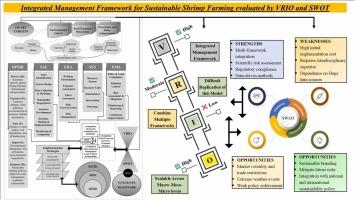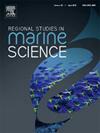Modeling management strategies for shrimp farming impact on the coastal delineation near the Northern Bay of Bengal in Bangladesh
IF 2.4
4区 环境科学与生态学
Q3 ECOLOGY
引用次数: 0
Abstract
Shrimp farming aquaculture in coastal regions of Bangladesh near the northern Bay of Bengal has become a significant industry contributing notably to nation’s economy through exports and local consumption. Several studies reveal that the shrimp farming leads to significant socioeconomic changes, environmental degradation by heavy metal contamination and toxic substances like NH3, NO2−, and H₂S, blue - green algae posing risks to both marine life and human health. Using primary and secondary data including field experiments, FGDs, KIIs and questionnaire surveys in coastal districts, this study aims to analyze perception towards socio-environmental impact of shrimp aquaculture and design an integrated management strategies model for sustaining the shrimp farming practices in coastal world. The statistical test result (F = 1.202, p = 0.312) shows that most of the impact factor variables associated with socio-environmental degradation had no significant effect individually; rather, the combined contributions of multiple variables shaped the complex challenges in coastal arena. To face these, the study develops an Integrated Management Framework applicable in international context for sustainable shrimp farming addressing the environmental, socio-economic and governance strategies through micro, meso and macro scales to guard the combined effects. The framework integrates five established key models (DPSIR, SAF, ERA, SES and EMS) for viable shrimp farming through baseline assessment, stakeholder involvement and governance strategies. Coupled VRIO-SWOT analysis helps to evaluate the model’s competitive advantages and sustainability. The model’s KPIs can offer actionable sustainable approach for international policymakers, industry stakeholders and researchers for enhancing eco-friendly aquaculture practices across diverse international coastal contexts.

模拟对虾养殖管理策略对孟加拉国孟加拉湾北部海岸划定的影响
在孟加拉湾北部附近的孟加拉国沿海地区,虾类养殖已成为一项重要产业,通过出口和当地消费为国家经济做出了显著贡献。多项研究表明,对虾养殖导致了显著的社会经济变化,重金属污染和有毒物质如NH3、NO2 -、H₂S、蓝绿藻等对环境的恶化,对海洋生物和人类健康构成威胁。本研究利用沿海地区的实地试验、fdd、kii和问卷调查等一手和二手数据,分析了对虾养殖对社会环境影响的认知,并设计了一个维持沿海地区对虾养殖的综合管理策略模型。统计检验结果(F = 1.202, p = 0.312)表明,与社会环境退化相关的大部分影响因子变量单独影响不显著;相反,多种变量的共同作用形成了沿海地区的复杂挑战。针对这些问题,本研究制定了一个适用于国际范围的可持续对虾养殖综合管理框架,通过微观、中观和宏观尺度处理环境、社会经济和治理战略,以防范综合效应。该框架通过基线评估、利益相关者参与和治理战略,整合了五个已建立的关键模型(DPSIR、SAF、ERA、SES和EMS),用于可行的对虾养殖。耦合VRIO-SWOT分析有助于评估模型的竞争优势和可持续性。该模型的关键绩效指标可以为国际决策者、行业利益相关者和研究人员提供可操作的可持续方法,以加强不同国际沿海环境下的生态友好型水产养殖实践。
本文章由计算机程序翻译,如有差异,请以英文原文为准。
求助全文
约1分钟内获得全文
求助全文
来源期刊

Regional Studies in Marine Science
Agricultural and Biological Sciences-Ecology, Evolution, Behavior and Systematics
CiteScore
3.90
自引率
4.80%
发文量
336
审稿时长
69 days
期刊介绍:
REGIONAL STUDIES IN MARINE SCIENCE will publish scientifically sound papers on regional aspects of maritime and marine resources in estuaries, coastal zones, continental shelf, the seas and oceans.
 求助内容:
求助内容: 应助结果提醒方式:
应助结果提醒方式:


